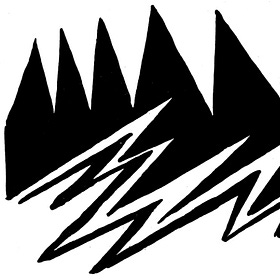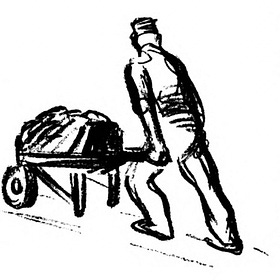—: Variations :— Wind in the sunlit trees, and the red leaves fall: Shadows of leaves on the sunlit wall. Wind in the turning tops of the trees . . . I am reminded, seeing these, Of an afternoon, and you Making the trees more scarlet, the sky more blue.
—: Illusions :— Green fingers lifting a pebble, green fingers uncurling, the slant and splash of a waterdrop between eternities; earth slipping from old roots, and the stealth of white petals in the sun all day long; brown chimney pots descending against a cloud in silence; between walls the dry whir of a sparrow's wings . . . am I these, or more?
—: Improvisations :— On the day when my uncle and I drove to the cemetery, Rain rattled on the roof of the carriage; And talking constrainedly of this and that We refrained from looking at the child’s coffin on the seat before us. When we reached the cemetery, We found that the thin snow on the grass Was already half transparent with rain, And boards had been laid upon it So that we might walk without wetting our feet.
“Although a Georgian by birth, Conrad Aiken is a neo-Imagist by training and a Freudian by inclination.” Began writing poetry at age 9; graduated from Harvard in 1912, after being elected class poet, and co-editing the Harvard Advocate, with T.S. Eliot. Later, was a “contributing editor of The Dial and on the staff of the Chicago Daily News.” (The Poetry Journal, 1917) In the 1920s was an editor of Coterie, the anthologies Modern American Poets (1922) and American Poetry: 1671-1928 (1929), and the Selected Poems of Emily Dickinson (1924). Mentor and close friend of English novelist and poet, Malcolm Lowry.
“Roughly speaking we can divide [poets] into two classes: those who contribute a definitely new note to the world's poetry... and those who are eclectic, who recombine and refine the known moods of poetry... The two contributions, both necessary, are essentially different: the originative type of poet chiefly contributes moods or attitudes, something unconscious, like the timbre of a voice, the expression of a face; whereas the contribution of the eclectic poet is chiefly an intellectual one—something conscious and schematic. The former is usually more subjective, more lyric,—the latter more objective, more analytic. For the purpose of explanation the cleavage has of course been made sharper than it really is. Every successful poet is both originative and eclectic.” (Aiken, in ‘The Impersonal Poet’, The Poetry Journal, 1917)
For Conrad Aiken By Dick Whyte letting go the leaf & wind befriend a commotion of birds, un consciously connective
Forgotten Poets Presents:
Forgotten Poems, a living anthology of obscure and out-of-print poetry from the late-1800s and early-1900s. Explore the archives:
More from The Book of Lost Rhymes . . .
Mary Brent Whiteside - Half Songs (1925)
—: Half Songs :— How little songs that never came to birth, Trouble the earth! Our fingers touch and let them pass; They vanish, whispering through the grass; Sweep like a sigh across a singing pine, And shine In the lost poetry of a blackbird's flight...
F.S. Flint - Cones (1916)
—: Cones :— The blue mist of after-rain fills all the trees; the sunlight gilds the tops of the poplar spires, far off, behind the houses. Here a branch sways and there a sparrow twitters. The curtains's hem, rose-embroidered, flutters, and half reveals a burnt-red chimney pot...
Pauline B. Barrington - "I Was A Year In The Trenches" (1917)
I was a year in the trenches Among the tear and spatter Of shrapnel. Among headless men, twisted men, mad men In masses...












Your poem for Conrad Aiken is utterly beautiful, Dick!
un
consciously
connective
So much. So little. Ideal.